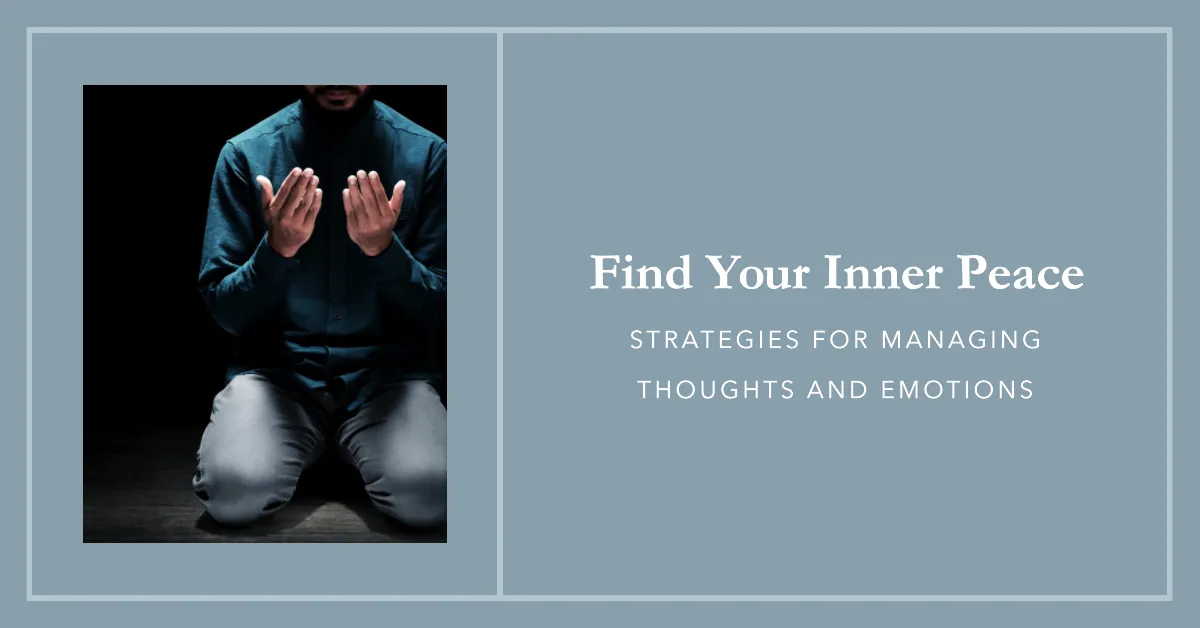Are you looking to enhance your mental fitness and unlock the full potential of your mind? Look no further than mind mastery. Mind mastery is the practice of developing a growth mindset, practicing mindfulness, building resilience, and managing thoughts and emotions. By incorporating these techniques into your daily life, you can improve your mental health, achieve greater success in all areas of life, and ultimately experience greater freedom.
To truly master your mind, it’s important to understand the basics of how it works. Your mind is incredibly powerful – it controls everything from your thoughts and emotions to your physical actions. However, many people allow their minds to control them rather than taking control of themselves. Through mind mastery techniques such as developing a growth mindset and practicing mindfulness, you can take back control of your thoughts and emotions and use them to achieve the results you desire. So why wait? Start mastering your mind today for a happier, healthier tomorrow.
Table of Contents
Key Takeaways
- Mind mastery is about taking control of thoughts and emotions to improve mental fitness.
- Developing a growth mindset involves embracing challenges and mistakes, setting realistic but challenging goals, and focusing on progress rather than perfection.
- Practicing mindfulness can reduce stress and anxiety, improve focus and concentration, and boost overall wellbeing.
- Building resilience is essential for maintaining optimal mental fitness in the face of life’s challenges.
Understanding the Basics of Mind Mastery
You’re probably wondering “What exactly is mind mastery?” Well, let me tell you – it’s all about taking control of your thoughts and emotions to improve your mental fitness. It’s a way for you to develop the ability to focus on what truly matters while eliminating distractions that hinder your progress.
Mind mastery is the process of understanding and controlling your thoughts and feelings, so they work for you rather than against you. The idea behind this concept is that by developing an awareness of how your mind works, you can take steps toward achieving greater mental clarity, focus, and inner peace.
When we master our minds, we are more likely to face challenges with calmness and perspective. Instead of letting negative emotions like fear or anxiety take over our thinking processes, we learn to manage them effectively and channel them into positive outcomes. Mind mastery also helps us cultivate a strong sense of self-awareness which allows us to understand ourselves better and make decisions that align with our values.
Mastering your mind takes time and dedication but can result in significant improvements in your overall wellbeing. With practice, you can develop the skills necessary to control your thoughts and emotions effectively. So why not start today? Take charge of your mind and watch as it transforms into a powerful tool for creating the life you desire!
Developing a Growth Mindset
If you want to improve your abilities, it’s important to adopt a growth mindset that embraces challenges and mistakes. Did you know that studies have shown people who have a growth mindset are more likely to achieve their goals than those with a fixed mindset? A growth mindset is a belief that abilities can be developed through hard work, dedication, and perseverance. This means accepting challenges as opportunities for growth and learning from failures instead of being discouraged by them.
Developing a growth mindset requires self-awareness and intentional effort. You must first recognize when you’re thinking with a fixed mindset and challenge those beliefs. Instead of thinking “I’m not good at this” try reframing it to “I haven’t mastered this yet”. This simple change in language can make all the difference in how you approach tasks and challenges.
Another key aspect of developing a growth mindset is setting realistic but challenging goals. When you set goals that push you out of your comfort zone, it forces you to develop new skills and approaches. Moreover, by focusing on progress rather than perfection, you’ll be able to stay motivated even when faced with setbacks or obstacles.
Adopting a growth mindset is crucial for mental fitness as it allows for continuous improvement and development. By embracing challenges as opportunities for growth, challenging negative beliefs, setting challenging goals, and focusing on progress rather than perfection; individuals can transform their lives positively. Remember that changing your thought patterns takes time but with patience, persistence, and dedication; achieving mental fitness through mind mastery is possible!
Practicing Mindfulness

If you’re looking to improve your mental fitness, practicing mindfulness is a great place to start. Benefits of mindfulness include reducing stress and anxiety, improving focus and concentration, and boosting overall wellbeing. To get started with mindfulness, try setting aside time each day for meditation or simply paying attention to your thoughts and emotions in the present moment. Remember that like any skill, mindfulness takes practice – but the rewards are well worth it.
Benefits of Practicing Mindfulness
Practicing mindfulness can enhance your mental fitness, as it helps reduce stress and improve focus. When you practice mindfulness, you train your mind to be present in the moment and observe your thoughts without judgment. This can help reduce anxiety and stress, as you learn to let go of negative thoughts and emotions that may be holding you back.
In addition to reducing stress, practicing mindfulness can also improve your focus and concentration. By training your mind to stay present in the moment, you become better at focusing on the task at hand. This can lead to improved productivity and a sense of accomplishment that further boosts your mental wellbeing. To illustrate the benefits of mindfulness, here’s a table showing how it compares to other popular forms of relaxation techniques:
| Relaxation Technique | Benefits |
|---|---|
| Mindfulness | Reduces stress, improves focus |
| Yoga | Reduces stress, improves flexibility |
| Meditation | Reduces stress, improves emotional regulation |
| Deep breathing | Reduces stress, lowers blood pressure |
| Progressive muscle relaxation | Reduces muscle tension, improves sleep |
By incorporating mindfulness into your daily routine, you can reap these benefits for yourself and start living a more fulfilling life with greater freedom from negative thoughts and emotions.
Practical Tips for Practicing Mindfulness
Let’s explore some easy ways to incorporate mindfulness into your daily routine. Mindfulness is a simple yet powerful tool that can help you cultivate self-awareness, reduce stress, and improve your overall mental health. Here are three practical tips to get started:
- Start with the breath: Focusing on your breath is one of the easiest ways to practice mindfulness. Take a few minutes each day to sit quietly and pay attention to your breath as it moves in and out of your body. If you find yourself getting distracted by thoughts or feelings, gently bring your attention back to the breath.
- Practice mindful eating: Instead of rushing through meals or snacking mindlessly throughout the day, try practicing mindful eating. This means paying close attention to the taste, texture, and smell of each bite you take. It can also involve being more aware of how certain foods make you feel.
- Take mini-mindful breaks: You don’t need hours of free time to practice mindfulness. Try taking short “mini-mindful” breaks throughout the day instead. For example, take several deep breaths before responding to an email or pause for a moment before starting a new task.
Incorporating mindfulness into your daily routine doesn’t have to be complicated or time-consuming. By starting with these simple tips, you can begin cultivating greater awareness and presence in your everyday life – ultimately leading to greater freedom from stress, anxiety, and other mental distractions that may be holding you back from achieving optimal mental fitness.
Building Resilience
Developing resilience is essential for maintaining optimal mental fitness in the face of life’s challenges. Resilience allows us to bounce back from setbacks, adapt to change, and overcome adversity. It gives us the strength and courage to face difficult situations and emerge stronger on the other side. Building resilience requires intentional effort and a willingness to step outside our comfort zone.
One way to build resilience is by practicing self-care. This involves taking care of our physical, emotional, and mental wellbeing. Getting enough sleep, eating a healthy diet, exercising regularly, and engaging in activities that bring joy can all contribute to building resilience. When we take care of ourselves, we are better equipped to handle stressors that come our way.
Another key factor in building resilience is having a positive mindset. This means focusing on what we can control instead of dwelling on what we cannot control. It means choosing optimism over pessimism, looking for opportunities instead of obstacles, and reframing negative thoughts into positive ones. When we have a positive mindset, we are better able to adapt to change and find solutions when faced with challenges.
Building strong social connections can also contribute significantly to building resilience. Having supportive relationships with family members, friends or colleagues provides a sense of belongingness that helps us cope during difficult times. These relationships offer emotional support when needed most; they help us feel less alone when facing adversity.
In conclusion, developing resilience is crucial for maintaining optimal mental fitness in today’s world where life’s challenges are inevitable. Practicing self-care, having a positive mindset, and building strong social connections are some ways through which one can develop this trait effectively. Remember that developing resilience takes time but it’s worth every effort put toward it as it will equip you with the strength necessary for overcoming any obstacle thrown your way!
Managing Thoughts and Emotions

When managing your thoughts and emotions, it’s important to understand the connection between the two. Your emotions are closely tied to your thoughts – what you think affects how you feel. This means that if you can learn how to manage your thoughts, you can also learn how to manage your emotions. There are practical strategies available that can help you gain control over both your thoughts and emotions, allowing you to build resilience and mental fitness in the face of challenges.
Understanding the Connection Between Thoughts and Emotions
Understanding the connection between thoughts and emotions is like unraveling a tangled ball of yarn – once you find the root, everything begins to make sense. Thoughts are the mental processes that occur in our brains, while emotions are the physical responses that arise from those thoughts. They are closely intertwined and often influence one another.
Here are some key points to keep in mind when it comes to understanding the connection between thoughts and emotions:
- Emotions can be triggered by both conscious and unconscious thoughts.
- Negative thoughts can lead to negative emotions, which can then result in negative behaviors.
- Positive thoughts can lead to positive emotions, which can then result in positive behaviors.
- Learning how to manage your thoughts and emotions effectively is essential for achieving mental fitness.
By understanding this connection, you’ll gain greater control over your emotional state and be better equipped to handle whatever life throws your way. Remember that you have the power to choose your thoughts, which means you also have control over your emotions. With practice and dedication, mastering your mind will become second nature.
Practical Strategies to Manage Thoughts and Emotions
Take control of your thoughts and emotions by implementing simple strategies that can help you manage them effectively and lead to a more positive outlook on life. One effective strategy is to practice mindfulness, which involves focusing your attention on the present moment without judgment or distraction. This can help you become more aware of your thoughts and feelings, allowing you to better understand them and respond in a more intentional way.
Another strategy is cognitive restructuring, which involves identifying negative thought patterns and replacing them with positive ones. To do this, create a table with two columns: one for negative thoughts and one for positive affirmations. Write down any negative thoughts that come to mind in the left column, then challenge them by coming up with a positive affirmation in the right column. Repeat these affirmations regularly to retrain your brain into thinking positively. By taking control of your thoughts and emotions through these practical strategies, you can improve your mental fitness and achieve greater freedom in all aspects of life.
| Negative Thoughts | Positive Affirmations |
|---|---|
| I’m not good enough | I am capable and worthy |
| Everything always goes wrong for me | I am resilient and will overcome challenges |
| Nobody likes me | I am loved just as I am |
| I’ll never be successful | My hard work will pay off |
| What if something bad happens? | I trust myself to handle whatever comes my way |
Incorporating Mind Mastery into Your Daily Life
By weaving mind mastery practices into your daily routine like threads in a tapestry, you can create a seamless and fluid approach to mental fitness. The first step is to identify the particular practices that work best for you. This may include mindfulness meditation, visualization techniques, or simply taking regular breaks from technology to disconnect from distractions.
Once you have identified your preferred mind mastery practices, it’s important to set aside time each day for them. This could be as little as 10 in the morning or before bed, or longer periods throughout the day when needed. Consistency is key here; incorporating these practices into your daily routine will help make them second nature.
Another helpful tip is to integrate mind mastery techniques into everyday activities. For example, while washing dishes or taking a shower, focus on the sensations of water on your skin and take deep breaths to quiet your mind. Or while walking outside, pay attention to the sights and sounds around you rather than getting lost in thought.
Remember that practicing mind mastery doesn’t have to feel like a chore – it can be enjoyable! Experiment with different techniques until you find what works best for you and approach it with an open mindset. With consistent practice and integration into daily life, mastering your mind becomes less of a goal and more of a way of being that promotes greater mental freedom and wellbeing.




